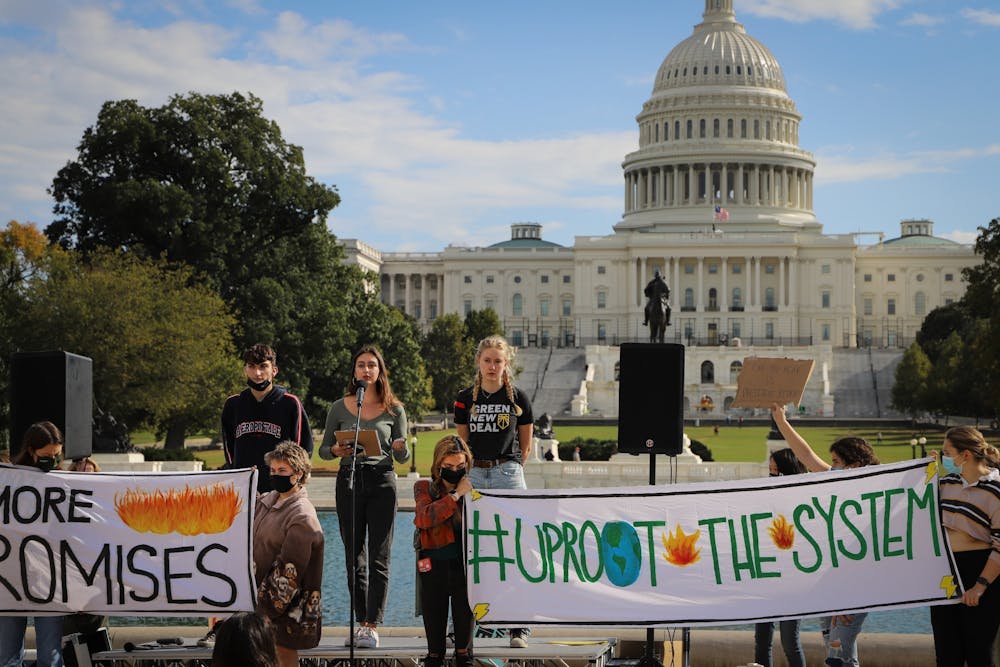Magnolia Mead was walking briskly. It was a chilly afternoon in late October, and Mead, an American University freshman, was keeping pace with Sen. Joe Manchin (D-WV) as he left the Capitol.
“Senator, my family is dying from the climate crisis,” Mead told Manchin, who, as chairman of the Senate Energy and Natural Resources Committee, had essentially killed President Joe Biden’s signature environmental legislation the previous week.
Manchin asked Mead for her name and where she was from, then told her she should be “a little more kind.”
“If you want to be quiet for a second, I could talk to you,” he added as Mead and other activists from People’s Watch, a coalition of activist groups, implored him to support the climate portion of the infrastructure legislation currently working its way through Congress.
“It’s honestly terrifying,” Mead said of her run-ins with politicians in an interview with The Eagle.
But coming face to face with D.C.’s power players — a tactic activists call “birddogging” — is nothing new to Mead. Since arriving at AU two months ago, she’s staked out politicians around the Capitol with such frequency that some know who she is — and know to avoid her.
“Josh Gottheimer actually ran away from me because he knew I was coming,” Mead said, referring to the Democratic representative from New Jersey. “He was like, ‘Nope!’”
Mead is a member of the climate activism group Fridays for Future D.C. in addition to Sunrise Movement AU. She began her activism career during the lead-up to the 2020 election in her hometown of Ithaca, New York. First, she used a grant from the Alliance for Youth Organizing to lead a voter registration drive at Cornell University. Then, she held a rally for climate action on a day of global climate strikes in March, and did the same on Earth Day in April.
“It’s kind of cliche, but Michelle Obama has this quote that says, ‘Change happens one person at a time,’” Mead said. “I heard her say that and I was just like, wow, I need to get out there and take initiative. People like me need to do that.”
Mead’s motivation to combat climate change comes from her family in Central America, some of whom are coffee farmers who, in recent years, have lost crops to drought and intense heat.
“For so long we’ve been so disconnected in the U.S. from the effects of our actions,” Mead said. “In the global south, they’ve been feeling this for the last decade or more.”
So Mead is taking to the streets. When she learned that Sunrise Movement AU had nothing planned for the Sept. 24 global Youth Climate Strike, she organized the D.C. strike almost entirely by herself in just two weeks. Roughly 100 people protested with her outside the Capitol that day. On Oct. 22, she organized another strike, this one including a march from Columbus Circle to the Capitol.
At the strikes, Mead and other activists addressed demonstrators from temporary stages set up on the grass in front of the Capitol. Mead spoke about the atrocities committed against Native Americans by the U.S. government and urged Congress to pass the Build Back Better Act, which originally included billions of dollars for climate-related programs.
The September strike also featured a “die-in,” where protesters lay on their backs in silence to illustrate the deadly consequences of inaction on climate change.
To her fellow activists, Mead is a relentless and inspiring colleague.
“Magnolia can easily be a leading figure in Washington, D.C. and possibly across the entire country when it comes to climate change,” said Salvatore Cottone, who does communications work for Sunrise Movement D.C. and helped lead the climate strikes with Mead.
Eden Lewis, who organized climate rallies with Mead in Ithaca this spring, described her as “a positive leader who doesn’t take anything from anybody.”
Mead’s activism comes at a pivotal moment in the fight against climate change. Politicians, diplomats and activists are gathered right now in Glasgow for COP26, the annual United Nations climate conference where world leaders are working to set new targets for reducing planet-warming emissions.
Biden, who has tried to position himself as a global leader on climate change, hoped to arrive at the conference with a major domestic climate bill already signed into law. But key aspects of his plan that activists supported, including the creation of a civilian climate corps and a program that offered financial incentives to companies that cut emissions, were removed from the bill in Congress because of Manchin’s opposition.
As negotiations over the bill continue, Mead hasn’t shied away from confronting some of the more divisive figures in Congress.
“I saw Marjorie Taylor Greene one time and I was like, ‘Oh my God, she's gonna totally laugh in my face,’” Mead said. “But I just did it anyway. And she did laugh. But once you get the hang of it, they're just regular people.”
It wasn’t always that easy for Mead. As a child, she said, she struggled with her self-confidence and didn’t talk much in class. But as she grew up into a world increasingly feeling the devastating impacts of climate change, her own anxieties began to seem less significant.
With two strikes under her belt, Mead is looking for more ways to make an impact on the country's climate plans. While she continues to push Congress to pass environmental legislation, she’s also working to grow the organizations she’s a part of in D.C. She hopes more people who want to get involved in the movement will reach out to her. The greater the number of protesters, Mead said, the greater the power behind their demand that the U.S. dramatically cut greenhouse gas emissions and invest immediately in renewable energy.
That may seem like a lofty goal for a relatively small group of protesters, but ask Mead if her work has a real impact and she’ll point you to specific examples. Last month, Speaker Nancy Pelosi was prepared to bring the bipartisan infrastructure bill passed by the Senate up for a vote in the House, angering progressives who said doing so violated their agreement to pass the bipartisan and reconciliation infrastructure bills together. Mead and other activists, hoping the still-developing reconciliation bill would contain climate provisions, spent days outside the Capitol talking to members of Congress, encouraging them to withhold support from the first bill until both were completed.
Eventually, progressives prevailed and the vote was delayed. They knew, Mead said, “that the people were on their side because we were there the whole time.”
It’s that all-consuming dedication, activists who work with Mead say, that will make her a central player in the long-term fight for climate justice.
“She’s very forward and knows what she wants,” Lewis said. “She’s very powerful.”





